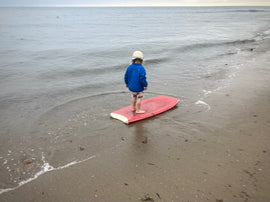Over 50,000 pounds of litter. 1,000-plus volunteers. Four years. (Mostly) one man at the helm.
These impressive numbers belong to Ocean Recovery Community Alliance (ORCA), a small non-profit based in Rhode Island and Connecticut dedicated to preserving our coastlines. Its method is simple: local beach cleanups.
But the organization does more than pick up trash.
In just a few years, ORCA has quickly become a force for good in southern New England, bringing communities together outside, positively impacting those who volunteer, and helping our oceans, waterways, and beaches. Now, the non-profit is working with our founder, Oliver Parker, to take its gear to the next level.
We caught up with ORCA Manager Kevin Carmignani to chat about the nonprofit’s story, local beach cleanups, and the exciting development that debut this month.
From Simple Start to Community Force
ORCA’s roots date back to 2020 when it began as a project from the Connecticut Community for Addiction Recovery. Kevin jumped on board that summer and has been the coordinator, scheduler, manager, and familiar face at cleanups ever since.
Today’s volunteers might recognize the branded ORCA van, blue tent, official signage, and streamlined setup, but it wasn’t always like that. At the start, Kevin reminisces, “There was just a tent from, like, Job Lot, and not even a proper table skirt. And there was a banner hung over that I put rocks on so it wouldn’t fly away.” Things have progressed since then. Locals know the name. ORCA has an established presence. Its gear is official and on-brand, and Kevin has to say “no” to certain opportunities due to a packed schedule.
But while ORCA may have evolved, its core mission has essentially stayed the same: help preserve coastlines through beach cleanups and collaboration. Or, in Kevin’s words, “It's just keeping it simple. It's just cleaning beaches and giving people in the communities an opportunity to give back to the beaches they go to, the beaches they vacation at, the beaches they take walks on every day.”
Uncomplicated. Straightforward. Effective.
How Do Cleanups Work?
ORCA’s cleanups are easy for volunteers. You show up, take a grabber and caddy, set off in search of litter, and return everything—trash included—to Kevin when you're done. Help as long as you’d like, whether that’s for thirty minutes or the entire cleanup.
On Kevin’s end, there’s a bit more work involved. Parking, permits, spot selection, and collaboration with other organizations, agencies, or brands are part of the job. He also looks for ways to dispose of trash at every site.
Top trash finds can vary based on the cleanup. Cigarette butts took the number one spot at a recent event on the Narragansett sea wall. Mylar balloons, bottle caps, lobster pots, and fishing gear are also frequent offenders. Among other litter, there’s also rope—which Kevin actually sends to a local creative to turn into art.
It’s Not Just a Beach Cleanup
While ORCA’s cleanups benefit our environment, they also benefit the volunteers and communities who participate.
Year-round cleanups encourage people to get outside, even in colder temps. (No, really. He had 164 volunteers at a winter cleanup three days after Christmas.) Communities come together for the common good. And the act of picking up trash itself is a mental balm of sorts. “It's almost a meditative sort of thing,” Kevin says. It’s easy to get into the zone at cleanups, allowing life's stressors to fall away. For him, it’s like a “flow state.”
Another welcome side effect is education. After all, collecting litter in beautiful, natural places is a blunt lesson in how trash impacts the environment. As Kevin says, “I think people's awareness of seeing how much of one specific thing they're picking up might change how they shop at the grocery store and what sorts of products they buy.”
Whether it’s the flow state, sunshine, community service, or eye-opening education, Kevin remarks, “I think people are surprised at how much they like it.”
Working with COD Founder on New Caddies

Now, through a design collaboration with our very own Oliver Parker, ORCA’s evolution is continuing with new earth-friendly caddies.
In the past, cleanups have mostly used plastic caddies and single-use plastic bags to collect trash. Now, thanks to grant money from Athletic Brewing Co., Kevin’s able to get a more sustainable upgrade.
On the new design, Oliver says, “We wanted to do away completely with plastic for the caddy, so now it’s made out of a nice marine plywood.” Single-use bags were replaced by an ultra-durable fine mesh (a 1000-denier vinyl coated mesh, for the designers out there) that holds up to repeated use, and they’re attached to the wood using “new old stock” zippers found unused in a factory.
“We also wanted to keep it pretty local as far as how and where they’re made, so we’ve engaged with a couple of local craftspeople,” Oliver explains. Jacob Guilbert from Right Coast Carving LLC CNC’d, or cut, the plywood, and the mesh bags were sewn by local Jennifer Judd.
The new and improved caddies made their debut at cleanups this month!
A Parting Message
Locals and visitors can find ORCA’s cleanup dates on Instagram, Facebook, or the organization’s website. For regular updates, subscribe to ORCA’s email list.
And, for those who aren’t in the New England area, Oliver shares this: “You have to act locally. There are organizations in coastal communities all over the country. The key is to engage with your local coastal cleanup organization.”
________
Speaking about sustainable gear…we recently broke down why our sustainable Gear Hauler Tote is the ultimate adventure sidekick. Read about it here.
Interested in working with Oliver on your own sustainable designs? Learn more about our design services.
Wishing you a great time outdoors, with whatever it is that you love to do (and your coastal cleanups). -COD


